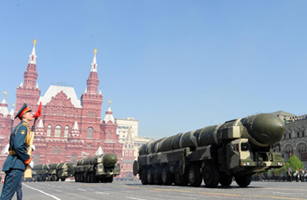Yet these are two powers which both straddle a continent, and which both have worldwide interests. Between them, let's not forget, they own enough firepower to blow us all to kingdom come. The Cold War may have ended nearly 20 years ago, but the way the U.S. and Russia deal with each other still matters.(See pictures of Russia celebrating Victory Day.)
Both nations want to find a new base for their relationship. They had a bitter falling-out over the weekend war in Georgia last August, when Russian forces invaded the territory of an American ally. That prompted intense criticism of Russia by the Administration of George W. Bush, and Russian officials remain deeply resentful at what they see as a refusal to accept that their military action was in response to intolerable provocation by the Georgian government.(See pictures of Russia's war with Georgia.)
It's now nearly a year since that spat, time enough for passions to have cooled somewhat. U.S. Secretary of State Hillary Clinton and Vice President Joe Biden have said they want to press a "reset" button with Russia, while Moscow, for its part, seeks a normal, stable and predictable relationship with the U.S. But neither side knows where and how to start. "Both are trying to figure out what they can get out of the relationship," says Coit Blacker, a Russia expert at Stanford University and former adviser to the Clinton Administration. "There's a lot of head-scratching going on."
What each nation most wants from the other is plain enough. The U.S. would like Russia to endorse and enforce tougher action to combat the nuclear ambitions of Iran and North Korea and to quit bullying democratic neighbors like Ukraine and Georgia. Russia would like the U.S. to recognize that it has its own sphere of influence in the "near abroad" — the territory of the old Soviet Union — and halt NATO's expansion to the east. More generally, Moscow would like some respect. "The Russians want to belong. They want to feel big," says Finland's Foreign Minister, Alexander Stubb, who has met with both Medvedev and Putin since Obama's Inauguration. "There's a sense of greatness in Russian history, and that's how they feel Russia should be treated."
Russia, to be sure, is not entirely dependent on a U.S. endorsement to feel important. In mid-June, it hosted two summits in the Ural city of Yekaterinburg: one with members of the Shanghai Cooperation Organization (which includes China and four Central Asian republics, as well as observer states India, Iran, Mongolia and Pakistan) and the other with leaders of the so-called BRIC nations — Brazil, Russia, India and China. Medvedev was the first foreign leader to receive Iran's President, Mahmoud Ahmadinejad, after his controversial re-election.(See pictures of the aftermath of Iran's election.)
Even so, there's nothing quite like a visit by the U.S. President to bolster Russia's status in the world. Moscow got an unexpected reminder of Washington's clout in its backyard when Kyrgyzstan announced on June 23 that it would renew an American lease on its air base in Manas, a critical transshipment point for U.S. and NATO military operations in Afghanistan. That decision was a victory for the Obama Administration: just four months ago, the Kyrgyz government had said that the U.S. military had to go. More broadly, Moscow's ability to project its power has been reduced by the fall in the price of oil since last summer; nearly 20 years after the end of communism and the introduction of market reforms, Russia's economy remains worryingly dependent on commodities.
Concern over the economy, indeed, may be one of the few things Obama has in common with Medvedev and Putin. For on the core issues, the countries remain apart.(See pictures of Barack Obama's family tree.)
http://www.time.com/time/magazine/article/0,9171,1908308,00.html?xid=rss-topstories






















